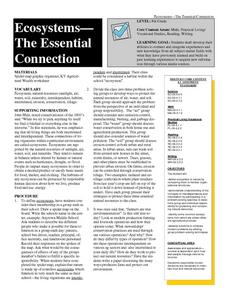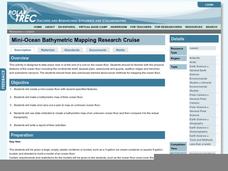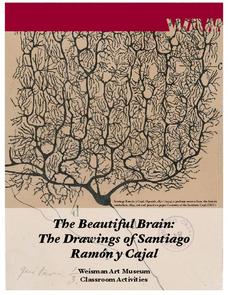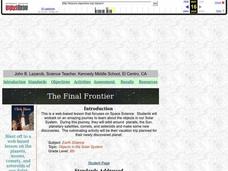Curated OER
History of Ponce de Leon in Florida
Based in sound Educational Theory, this instructional activity uses art to convey the story of Ponce de Leon. Mild to moderately disabled students hear the story of the Fountain of Youth, examine a paining of Ponce de Leon, and act out a...
Curated OER
What a Character!
Middle schoolers read a novel and discuss character personality. First, they analyze a character in a novel and keep a chart or web of the character's identity, which includes specific examples from the book. They then write a script...
Curated OER
Transportation Fuels: The Future is Today
Assign each group of 3-4 upper elementary engineers to a different type of transportation fuel. A background information page is provided to get them started with researching their assigned fuel. Each group then produces an exhibit or a...
Curated OER
Using Primary Sources to Study the Holocaust
Engage your middle schoolers with Pastor Martin Niemoller's famous poem that begins, "First they came for the communists." Now that you have their attention, send learners to the various work stations you created to have them explore...
Curated OER
The Quilting Connection....a Teaching Unit on Slavery, the Underground Railroad And Quilting
Students research the Internet, read designated books and selection, participate in discussions and write short reports while completing this series of lessons about slavery and the Underground Railroad. As a final project, they design a...
Curated OER
Why A Bill of Rights?
Examine conflicting viewpoints in this lesson, in which middle schoolers write their own proposal for including a Bill of Rights in the Constitution. As a class, they discover how the Bill of Rights was not a planned document to be...
EngageNY
Estimating a Population Proportion
Find the percent of middle schoolers who want the ability to freeze time. The 21st installment in a series of 25 has groups collect a random sample of respondents who answer a question about superpowers. Using sample statistics,...
Beyond Benign
Real Cats Wear Pink
Does your cat sneak up on you in the middle of the night? Maybe it would help if he glowed in the dark like Mr. Green Genes, the first fluorescent cat in America. In a fun and engaging lesson about genetic engineering, high school...
Endangered Species Coalition
Endangered Species Day Art
Albrecht Durer created a highly textured stamp or print of a rhinoceros. To better understand which animals are near extinction, upper graders create similar prints of endangered animals they've researched. The six-day lesson includes...
Curated OER
Crash Course in Flight
High school physicists demonstrate Bernoulli's Principle by blowing on different items and finding that they do not move in the expected direction! They apply Bernoulli's equation to the flight of an airplane. This well-organized lesson...
Curated OER
Ecosystems-The Essential Connection
Students develop their abilities to solve problems both in school and in a variety of situations similar to that they have encountered in life. They define the term ecosystem in nature by comparing them to familiar organizational...
Curated OER
Owls: Top of a Food Chain
Although written for middle schoolers, there is no reason that a 3rd, 4th, or 5th grader could not also learn about food chains through the dissection of owl pellets. After you introduce the topic, learners complete an owl research...
Polar Trec
Mini-Ocean Bathymetric Mapping Research Cruise
Middle or high schoolers transform into oceanographers in a week-long simulation. To begin, each group follows directions to create a model of the ocean floor with specified features. Next, the groups prepare to set sail on a research...
Scholastic
Dear Miss Breed
This compelling plan based on the letters in the book Dear Miss Breed engages readers in learning what it was like for Japanese Americans following the attacks at Pearl Harbor. After reading the letters, young scholars will partake in...
Beyond Benign
Intended Occupants
Here's a lesson you can really build on! Middle schoolers describe the occupants of an imaginary house during a character-building lesson. They create a cast of characters who share living space and provide details about their attitudes,...
Center for History and New Media
The Impact of the Jim Crow Era on Education, 1877–1930s
Even though American slaves were officially emancipated in 1865, the effects of slavery perpetuated throughout the 19th and 20th centuries. Middle and high schoolers learn about the ways that discrimination and the Jim Crow laws...
Newseum
Evidence: Do the Facts Hold Up?
Sometimes it's hard to escape bad information! Pupils learn the E.S.C.A.P.E. method for evaluating news sources and complete a worksheet to assess a news article using their new skills.
University of Minnesota
Beautiful Brain: Do You See What I See?
Can art play tricks on your eyes, and can a still painting really appear to vibrate? The second instructional activity in a four-part series discusses the way our beautiful brains translate visual images. It highlights the style of...
University of Minnesota
Beautiful Brain: Step Inside the Brain
Before digital microscopes, scientists hired artists to draw the things visible in the microscope. Through training in neuroscience and art, Cajal revolutionized the way we view the beautiful brain. The third lesson in a series of four...
University of Minnesota
Beautiful Brain: Brain Inspiration
"Neuroscientists consider Cajal as important to their discipline as Einstein is to physics." The first of four lessons has scholars view Santiago Ramon y Cajal's drawings of neurons. They reflect and respond to the art through writing...
University of Minnesota
Beautiful Brain: Strangest Dream
Do words change or add meaning or interest to a work of art? The final lesson in a four-part series on the beautiful brain as a work of art focuses on art analysis. Scholars write a story about exploring art from the inside. Reflections...
Curated OER
Two Cultures, One Home: The Israeli-Palestinian Conflict Over Land in the Middle East
Examine the Israeli-Palestinian conflict. Learners research the 50 Years War and analyze the conflict through the point of view of both sides They attempt to develop a plan to bring peace to the region of Israel.
Curated OER
Planets in Our Solar System
Each member of a four-student group takes on a specific aspect of an assigned planet to research. After gathering information, the team works together to create a travel brochure and a presentation intended to convince other classmates...
Curated OER
Decimal and Fractions - Part One
Pupils explore the concept of converting decimals to fractions. In this conversion instructional activity, learners convert decimals to fractions.
Other popular searches
- Middle School Lessons Health
- Art Lessons Middle School
- Nouns Lessons Middle School
- Thematic Lessons Middle School

























